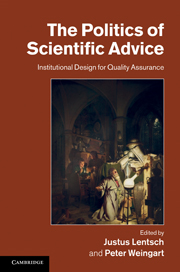Book contents
- Frontmatter
- Contents
- List of figures
- List of tables
- Acknowledgements
- Biographical notes
- Part I Methodological issues: quality control and assurance in scientific policy advice
- 1 Introduction: the quest for quality as a challenge to scientific policy advice: an overdue debate?
- 2 Quality control and peer review in advisory science
- 3 Reconciling representation with reality: unitisation as an example for science and public policy
- 4 Looking for quality in all the wrong places, or: the technological origins of quality in scientific policy advice
- Part II Collegial science advisory bodies
- Part III Collegial science policy advisory bodies
- Part IV Research-based advisory organisations
- Part V Academies of science
- Index
- References
1 - Introduction: the quest for quality as a challenge to scientific policy advice: an overdue debate?
Published online by Cambridge University Press: 25 October 2011
- Frontmatter
- Contents
- List of figures
- List of tables
- Acknowledgements
- Biographical notes
- Part I Methodological issues: quality control and assurance in scientific policy advice
- 1 Introduction: the quest for quality as a challenge to scientific policy advice: an overdue debate?
- 2 Quality control and peer review in advisory science
- 3 Reconciling representation with reality: unitisation as an example for science and public policy
- 4 Looking for quality in all the wrong places, or: the technological origins of quality in scientific policy advice
- Part II Collegial science advisory bodies
- Part III Collegial science policy advisory bodies
- Part IV Research-based advisory organisations
- Part V Academies of science
- Index
- References
Summary
How can science best be harnessed to support political decision-making? How should scientific advice to policymakers be institutionalised in government to be more accountable to academic science and public concerns at the same time? Concerns about the quality of scientific expert advice to policymakers have been raised for years, particularly in the UK and on the European level. Public debates such as the BSE case, the controversy about genetically engineered food, the foot-and-mouth disease (FMD) or the failure of experts and their risk models in the global financial crisis, have demonstrated that the legitimacy of experts and of the policymakers whom they advise essentially depends on the reliability and transparency of scientific advice. They have highlighted the absence of clear rules to follow as well as the lack of a legal framework and organisational structures for obtaining advice from academics. This lacuna has been further highlighted by the recent call for an institutional reform of the Intergovernmental Panel on Climate Change (IPCC) in reaction to allegations of shortcomings in its most recent assessment report. Thus, the issue of quality control and assurance in scientific expert advising is of vital importance for both decision-makers and the academic community.
- Type
- Chapter
- Information
- The Politics of Scientific AdviceInstitutional Design for Quality Assurance, pp. 3 - 18Publisher: Cambridge University PressPrint publication year: 2011
References
- 14
- Cited by

